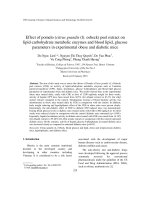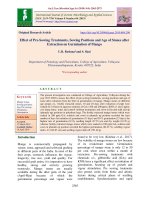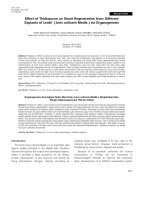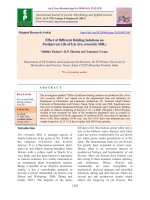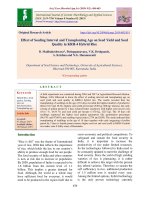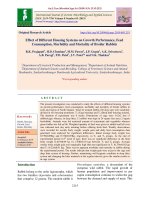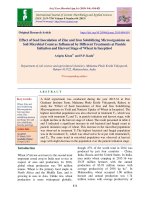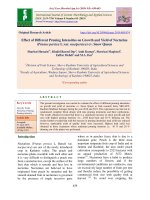Effect of different age of rootstock on grafting of jackfruit (Artocarpus heterophyllus L.) var.Palur-1
Bạn đang xem bản rút gọn của tài liệu. Xem và tải ngay bản đầy đủ của tài liệu tại đây (229.79 KB, 5 trang )
Int.J.Curr.Microbiol.App.Sci (2018) 7(8): 3994-3998
International Journal of Current Microbiology and Applied Sciences
ISSN: 2319-7706 Volume 7 Number 08 (2018)
Journal homepage:
Original Research Article
/>
Effect of Different Age of Rootstock on Grafting of Jackfruit
(Artocarpus heterophyllus L.) var.Palur-1
K.E. Naik* and C. Subesh Ranjith Kumar
Department of Fruit Crops, Horticultural College and Research Institute, Tamil Nadu
Agricultural University, Periyakulam - 625 604, Tamil Nadu, India
*Corresponding author
ABSTRACT
Keywords
Rootstock, Jackfruit
(Artocarpus
heterophyllus L.)
Article Info
Accepted:
22 July 2018
Available Online:
10 August 2018
An experiment was conducted during 2016–17 at Department of Fruit Crops, Horticultural
College and Research Institute, Periyakulam for determining the age of rootstock for
grafting in jackfruit by softwood grafting method. Experiment was laid out on Factorial
Completely Randomized Design (FCRD) with three replications. Growth parameters like
days taken for graft union, graft success (%), days taken for sprouting, number of sprouts,
length of sprouts (cm), plant height (cm), girth of rootstock (cm), girth of scion (cm),
number of leaves, leaf length (cm), breadth of leaf (cm), leaf area (cm2), graft survival (%)
at 30, 60 and 90 days after grafting were recorded. On comparing the performance of
different age of rootstocks used, 30 days old rootstock gave successful grafts and improved
growth parameters. Physiological parameters also showed positive response in 30 days old
rootstock.
Introduction
in the triple fruit concept (Mango, Jackfruit
and Banana) mentioned in Hindu scriptures.
Jackfruit is a popular fruit in several tropical
and sub-tropical countries. It is regarded as
“poor man’s fruit” in eastern and southern
parts of India. Jackfruit is believed to be
native of India, originating in Western Ghats
and is widely cultivated in Malaysia,
Myanmar, Indonesia, Bangladesh, Sri Lanka,
Brazil, West Indies, Vietnam, Pakistan and
other tropical countries (Bose and Mitra,
2002; Anonymous, 2009). In India, the total
area
under
jackfruit
cultivation
is
approximately 1,51,000 hectares (Source:
Ministry of Agriculture and Farmers welfare,
2016). In Tamil Nadu, jack fruit is considered
as the second most important fruit after mango
Huge variability exists in this crop due to seed
propagation. Among the various constraints
for expanding the jackfruit cultivation, lack of
availability of suitable clonal planting
materials is one of the impediments to expand
the area of cultivation (Anonymous, 2009).
There is great demand for genuine true-to-type
planting materials in order to optimize
production of quality fruits. For this reason
vegetative propagation is essential to get trueto-type propagules. So the quality planting
materials having uniform characters are the
utmost demand of the farmers nowadays,
hence standardization of suitable vegetative
3994
Int.J.Curr.Microbiol.App.Sci (2018) 7(8): 3994-3998
propagation technique with age of scion and
rootstocks is prerequisite for successful
cultivation and also will help in fixing the
characters of superior types (Bose and Mitra,
2002).
30th, 60th and 90th days after grafting. The
grafting operation was done at 15 days
interval using procured scion sticks of Palur-1
jack on the raised rootstock.
Results and Discussion
Materials and Methods
The studies on softwood grafting in jackfruit
plants were carried out during 2016-17 at the
Department of Fruit crops, Horticultural
College and Research Institute, Tamil Nadu
Agricultural University, Periyakulam. The
experiment location is situated at an elevation
of 300 m above mean sea level, at 100 North
Latitude and 77.80 East Latitude. Seeds were
collected from local and the rootstocks were
raised in polythene bags. Scions of Palur-1
jackfruit variety were grafted in the raised
rootstock in different period. Plumpy and
healthy jack seeds weighing about 4 to 7 g
were collected from local and were utilized for
raising seedling rootstock. These seeds were
soaked in water for 24 hours to enhance
germination and then sown in the polythene
bags.
Polythene bags of 250 gauge (5”-7”) thickness
were used for raising jack rootstocks. The pot
mixture for rooting medium was prepared with
red earth, sand, well decomposed farmyard
manure (2: 1: 1) and filled in the poly bag.
The selected large sized healthy seeds were
laid flat on the medium with their hilum part
facing down. The pot mixture for rooting
medium was prepared with red earth, sand,
well decomposed farmyard manure (2:1:1)
and filled in the poly bag. The selected large
sized healthy seeds were laid flat on the
medium with their hilum part facing down.
The seeds which were sown in the polythene
bags and the softwood grafts were grown in
different growing conditions viz., mist
chamber (C1) and shade net house (C2).
Grafting parameters and physical parameters
were recorded at three different stages viz.,
In this study, an attempt has been made to
propagate Palur-1 (Scion) the ruling variety of
Tamil Nadu through softwood grafting with
different age of rootstocks. Number of days
taken for the union influenced significantly by
the age of rootstocks in mist chamber.
Grafting done on 30 days old rootstock took
the least number of days for graft union (24.07
days) and the maximum number of 27.96 days
taken for graft union grafting on 135 days old
rootstock (Table 1). The maximum graft union
success was reported in case of 30 days old
rootstocks in both the mist chamber and shade
net house conditions. This might be due to the
prevailing optimum temperatures coupled with
higher humidity experienced in the November
month resulting in early contact of cambium
layers of stock and scion. More over the 30
days old rootstock recorded the maximum
success rate of 85.40 per cent on 30th day and
also gave earlier sprouting (19.20 days) (Table
1). It is due to the preservation of more food
materials in cotyledon and actively growing
stage of rootstock that enhance union in
grafting. These results were on agreement
with the findings of Jose and Valsalakumari
(1991) and Dhar (1998). The sprouting of
scions in the grafted union has a direct impact
with the precured scions used for the grafting.
The beneficial effect of precuring is well
recognized in crops like cashew nut (Swamy,
1993) and jackfruit (Maiti and Sen, 1999) to
enhance the graft success. Maximum plant
height (15.67 cm) was obtained in the 30
day’s old rootstock (Table 1). This might be
due to the scion quality collected during the
month of November 2016 coincides with the
North East monsoon rain fall falls on during
October 2016.
3995
Int.J.Curr.Microbiol.App.Sci (2018) 7(8): 3994-3998
Table.1 Effect of different age of rootstocks on growth parameters of jackfruit
Treatment
(T)
Graft
union
(days)
30DAG
Graft
success
(%)
30 DAG
Days taken
for
sprouting
Plant
height
(cm)
30 DAG
Number
of leaves
30 DAG
Leaf
length
(cm)
30DAG
Leaf
breadth
30DAG
Leaf area
(cm2)
30DAG
Graft
survival
percentage
(%)
A1
26.71
71.54
19.99
12.39
1.95
2.22
0.80
2.15
63.86
A2
24.07
85.40
19.20
15.67
2.76
3.27
1.06
2.38
69.09
A3
26.86
71.44
19.74
13.39
1.92
2.71
0.90
2.26
61.92
A4
26.66
77.92
20.20
12.51
2.26
2.24
0.84
2.08
58.21
A5
26.69
81.45
19.98
13.31
2.13
2.34
0.76
1.76
68.54
A6
26.76
75.69
20.00
14.30
2.06
1.95
0.74
1.43
65.39
A7
27.56
71.25
20.21
12.26
1.48
1.70
0.86
1.39
59.36
A8
27.30
69.98
20.09
10.95
1.49
1.65
0.73
2.14
55.83
A9
27.96
66.31
20.87
9.69
1.26
1.58
0.71
1.35
50.85
Mean
26.72
74.71
20.03
12.71
1.92
2.17
0.82
1.88
61.44
S.Ed
0.271
2.920
0.337
0.691
0.084
0.098
0.027
0.088
1.236
CD @0.05
0.552
NS
0.686
1.408
0.171
0.200
0.116
0.187
5.338
A1: 15 DORS, A2:30 DORS, A3: 45 DORS, A4: 60 DORS, A5:75 DORS, A6: 90 DORS, A7: 105 DORS, A8: 120 DORS, A9: 135 DORS
DORS - Days Old Root Stock
DAG – Days After Grafting,
NS: Non significant
3996
Int.J.Curr.Microbiol.App.Sci (2018) 7(8): 3994-3998
Table.2 Leaf chlorophyll content and total phenol content at different age of
Rootstock before grafting
Treatment (T)
A1
A2
A3
A4
A5
A6
A7
A8
A9
Leaf chlorophyll content (mg/g)
15.41
18.22
21.28
24.66
28.23
33.40
39.45
47.25
52.62
30 days oldrootstock
Precuredscion
These conditions favoured better growth of new
flushes, consequently the change in the
endogenous hormonal level as reported by
Priyanka et al., (2017) in jackfruit. Maximum
number of leaves (2.76 days) and highest leaf
length (3.27 cm), leaf breadth (1.06 cm), leaf
area (2.38 cm2) were observed in 30 days old
rootstock (Table 1). The highest magnitude in
number of leaves on 30th, 60th and 90th days
after grafting was found in 30 days old
rootstock which might be due to earliest
sprouting and appropriate time of grafting. This
suggest thatthe30 days old rootstocks might be
having the adequate biochemical constituents
like carbohydrates, auxin etc., to initiate the
proliferation of callus cells at the graft interface
leading to formation of callus bridge and
Total Phenol content (mg/g)
2.04
2.15
2.61
3.62
3.84
4.52
4.58
5.26
5.44
Grafts
vascular differentiation across the graft
interface, resulting in more graft success.
Maximum graft survival percentage (69.90 per
cent) was observed on 30 days old rootstock
(Table 1). This happens because the grafting
time might have favoured the information of
new cambial layer in the cambium bridge at the
right time and laying down new secondary
xylem toward the inside and phloem toward the
outside in deriving the vascular connection.
This process of completion before the new bud
and leaves formation ensured highest survival
percentage in the present study. The work of
Gholap Supriya et al., (2015) in mango,
Prajapati et al., (2014) on mango was in support
with present study.
3997
Int.J.Curr.Microbiol.App.Sci (2018) 7(8): 3994-3998
The highest leaf chlorophyll (52.62 mg/g) and
total phenol content (5.44 mg/g) was registered
in 135 days old rootstock while the lowest
phenol content was recorded in 15 days old
(2.04 mg/g) followed by 30 days old rootstock
(2.15 mg/g) (Table 2). The leaf chlorophyll
content is an important physiological parameter
as it directly influences the photosynthesis and
reflect in the size of the leaf. The significant
difference observed in leaf chlorophyll content
in the present study before the time of grafting
might be due to the increase in the
photosynthesis efficiency of leaves and the
results are in agreement with Chandan et al.,
(2006). The variation in the presence of phenol
content in the different age of root stocks
showed it influence on the graft union success.
The low phenol content is registered at 30 days
old rootstock which might be one of the reasons
to get higher graft success (%) and the result is
in line with the work of Selvi (2008). From this
study, it could be inferred that 30 days old
rootstock is more suitable in producing
successful softwood grafts of Palur-1 jackfruit
which can be recommended during the month
of November using precured scions.
References
Anonymous. 2009. Jacks Special (Kannada).
Adike Patrike, 21(7): 1- 38.
Bose, T. K. and Mitra, S.K. 2002. Jackfruit in
Tropical and Subtropical fruits, Naya
Udyog Calcutta, 2: 95-97.
Chandan, P.M., J.H. Kadam and Ambad, S. N.
2006. Effect of different polyembryonic
and monoembryonic rootstocks on
performance of Dashehari mango. Intl. J.
Agric. Sci., 2(2):594-595.
Dhar, M. 1998. Techniques of vegetative and in
vitro propagation of jack fruit. Ph.D.
dissertation. Institute of Postgraduate
Studies in Agriculture (IPSA), Salna,
Gagipur, Bangladesh, pp: 151
Gholap Supriya, S. and Polara, N. D. 2015.
Effect of growing media and storage of
stone on the success and survival of soft
wood grafting in Mango (Mangifera
indica L.)The American Journal of
science and medical research. Acta Hort,
989: 264-267.
Jose,
M.
and
Valsalakumari,
P.K.
1991.Standardization of the technique of
epicotyl and softwood grafting in jack
(Artocarpus heterophyllus Lam.). South
Indian Hort. J., 39: 264-267.
Maiti, C. S. and Sen, S.K. 1999. Effect of pretreatments of scion on grafting success in
Jack fruit (Artocarpus heterophyllus L.),
Hort. J., 12 (2): 97-99.
Prajapati, G. K. Patel, M. M., Bhadauria, H. S.,
Varma, L. R., Modi, D. J. and V.R.
Garasiya. 2014. Study of softwood
grafting on different mango varieties.
Asian J. of Hort., 9: 240-242.
Priyanka H.L., Vinay G.M., Hipparagikulapati,
Deepak, G., Nayan Mamatha, N. P. 2017.
Effect of rootstocks age on softwood
grafting
in
jackfruit
(Artocarpus
heterophyllus Lam.). Inter. J. of Agri.
Sci., 9 (12): 4043-4044.
Selvi, R., Kumar, N., Selvarajan, M. and Anbu.
S. 2008. Effect of environment on
grafting success in jackfruit. Indian J.
Hort., 65(3): 341-343.
Swamy, G.S.K. 1993. Standardization of
vegetative propagation techniques in jack
fruit (Artocarpus heterophyllus Lam.).
Ph.D. Thesis, Univ. Agric. Sci.,
Bangalore.
How to cite this article:
Naik, K.E. and Subesh Ranjith Kumar, C. 2018. Effect of Different Age of Rootstock on Grafting
of Jackfruit (Artocarpus heterophyllus L.) var.Palur-1. Int.J.Curr.Microbiol.App.Sci. 7(08): 39943998. doi: />s
3998
